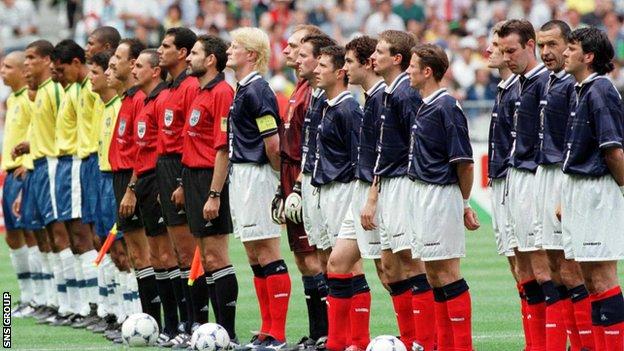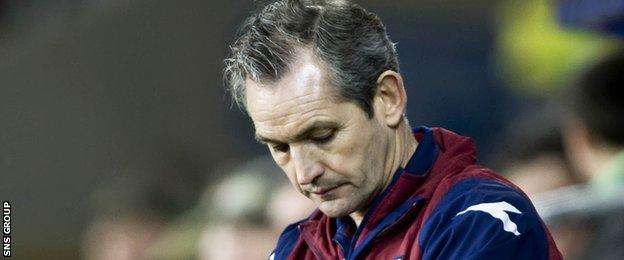Scotland's Game: The world stage

Last updated on .From the section Scotland

Set against a backdrop of the rise of Margaret Thatcher's Conservative government in Westminster and a terrible decline of Scotland's manufacturing industry, it is the turn of the national team to enter the story of Scotland's Game.
The mood in Scotland back in 1986 was, according to the historian Professor Tom Devine, one of "humiliation, bitterness, worry, deep anxiety, insecurity and, perhaps, above all, anger."
In Scotland's football world there was the great sadness of Jock Stein's sudden death on the touchline at Ninian Park in Wales in September 1985. Even now the footage sends a shiver up the spine. Graeme Souness running up the tunnel in panic. Grown men in tears. "Jock had been in a stressful way all day, he looked drawn, he looked grey," says Gordon Strachan, one of Stein's most important players.
Stein stands over episode three like the giant he was. "The guru," as Andy Roxburgh calls him.
What follows is a journey in disappointment, a trip through the near-misses and assorted horror shows at major championships from 1986 to 2016. It's been 18 years since the wheels stopped turning and Scotland started to fade into irrelevance in international football.
There's the angry commentary of Archie Macpherson as the boot boys of Uruguay kicked Scotland out of the 1986 World Cup. "The scum of world football," as Ernie Walker, the behemoth of the SFA, called the South Americans in the aftermath.
There's the plaintive cries when Juan Cayasso - the Costan Rican who achieved immortality in this country - drives a dagger into Scottish hearts in 1990, a despair that very quickly turned to fury, most of it directed at Roxburgh.
There's the black humour of some of the headlines. "Worst In The World!" "Why Are We So Bad?" "Frankly, We Stink!" And then, more to worry about. The changing face of the world in Russia and Yugoslavia - new nations, new competition.
The Craig Brown era came. The Euros were held in England in 1996 and he was told by the SFA that Scotland had better be there. Not that Brown needed any telling. "(Had Scotland not qualified) I would have been so ashamed and embarrassed," says Brown. "I definitely would have emigrated. It was in England, so you had to qualify."
Scotland hit the wall after the World Cup in 1998. At Hampden, they counted the managers in and they counted them back out again. Brown replaced by Berti Vogts replaced by Walter Smith replaced by Alex McLeish. On it went, the only constant being failure to make it to a major championship.

Well, perhaps, not the only constant, Drama, of a kind, was never far away. Drama and suspicion and rancour. McLeish remains deeply dubious about refereeing motives in a must-win game against Italy at Hampden in November 2007.
Drama, again, in the George Burley era. Terry Butcher was his assistant. "There was a lot of cliques (in the squad)," he recalls. "There was the Rangers group, there was the Celtic group. It was a lot of hard work because you had, with Rangers especially, so many big egos and so many powerful figures."
Steven Pressley, still a Celtic player at the time, was also part of Burley's coaching ticket. "There was players in there from Rangers and other clubs that maybe felt that having a Celtic player on the coaching staff wasn't right," he says.
Pressley is critical of Burley but really trains his guns on Barry Ferguson over the so-called Boozegate episode in 2009, the drinking session between qualifying matches for World Cup 2010 and the infamous V-signs to the media that saw the end of Ferguson's international career.
"Barry let himself down - the team down - there's no doubt about that," says Pressley. "I think it could've been handled better from within. Barry's actions were not the actions of a Scotland captain and a top professional."
The managerial door revolved again. Out went Burley and in came Craig Levein - and nothing changed. Levein never recovered from playing a 4-6-0 formation against the Czech Republic in Prague. "It became a stick to hit me with," he says. "When it comes right down to it, I gave them the stick."
And so a new manager came. From Uefa there was good news about an expanded Euro 2016. Twenty four teams would qualify. According to the vernacular of the time, it was almost harder not to qualify than to qualify.
Strachan was the man entrusted with the job of making Scotland relevant again. That dream crashed and burned in Georgia when Scotland suffered a loss that cost them a place in the play-offs.
The wait goes on and the grim landmarks on Scotland's unending road back to a major championship pile ever higher. Strachan's team began the qualifiers for World Cup 2018 with a 5-1 win over Malta backed by a PR campaign that says, 'This Time'.
'This Time' for what? More of the same or a new beginning? The nation prays for the latter. It's been too long. Way, way too long.
The third episode of Scotland's Game airs on BBC One Scotland on Thursday at 21:00 BST.